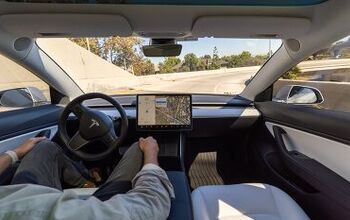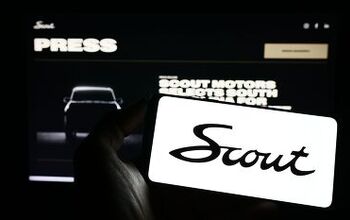Bailout Watch 391: "We're All Going To Be Peeling Bark Off Trees"

Car analyst Erich Merkle was a cheery guy. A few days ago, as reported by mlive, he still believed Ford will thrive and GM will survive with government help. He had his doubts about Crisis LLC, but who hasn’t.
Now suddenly, Merkle joins the ranks of those who gather their maps to plot a path for the hills. The main problem of the car industry is that there aren’t enough buyers. There are fewer by the day. People are losing jobs. With more on the dole, there will be fewer in the showrooms. “I’m concerned about the job losses. The acceleration is pretty alarming, and that has to stabilize,” Merkle said to Reuters.
“If we don’t beat the second half of 2008 this year, then it could be all over,” said Merkle. “We’re all going to be peeling bark off trees and go back to being an agrarian society.”
Currently, we are far from beating the second half of 2008. The prospects look even dimmer in coming months after U.S. auto sales plunged 37 percent in January to the slowest pace since 1982. If Merkle is right, we don’t have to worry about lithium. Except in our pills. Tree bark will be a scarce commodity. He’s not alone to be worried.
“The whole industry is in serious trouble,” IHS Global Insight analyst Aaron Bragman said. “The pain is starting to be shared across the board.
Except for begging, the Detroit automakers have been doing precious little to adapt to the market changes. Even if they would, “you can restructure these companies all you want. But unless people start buying cars again you’ll have wonderfully restructured companies that are bankrupt,” Bragman said. “Restructuring” is a euphemism for fewer jobs. Fewer jobs, fewer buyers.
The federal stimulus package includes provisions to allow consumers to deduct sales taxes on vehicle purchases. Ford says that could save buyers roughly $1,500 on a $25,000 car. Big deal, says Jim Hossack, vice president of industry forecaster Auto Pacific. “If the $6,000 rebates that Chrysler is offering on top of zero-percent financing can’t sell cars, a $1,500 incentive won’t do much.” Again, not enough buyers.
“In 38 years in the auto industry, I’ve never seen it like this,” Hossack said. “Those who have the financial ability to buy cars aren’t going to until they feel wealthier. They’ve seen the value of their house and their 401(k) drop, and until they feel better about their own finances they aren’t going to take on any new commitments.”
Next week, there will be another round of begging. There will probably be a show trial for public consumption. Followed by a backroom deal and more money. And then?
“I’m not sure the government knows what to do or how to do it. It’s hard to have confidence in anyone’s intentions or ability to solve these problems. A month ago I thought it was possible. Now I’m not so sure,” Hossack said.

Bertel Schmitt comes back to journalism after taking a 35 year break in advertising and marketing. He ran and owned advertising agencies in Duesseldorf, Germany, and New York City. Volkswagen A.G. was Bertel's most important corporate account. Schmitt's advertising and marketing career touched many corners of the industry with a special focus on automotive products and services. Since 2004, he lives in Japan and China with his wife <a href="http://www.tomokoandbertel.com"> Tomoko </a>. Bertel Schmitt is a founding board member of the <a href="http://www.offshoresuperseries.com"> Offshore Super Series </a>, an American offshore powerboat racing organization. He is co-owner of the racing team Typhoon.
More by Bertel Schmitt
Latest Car Reviews
Read moreLatest Product Reviews
Read moreRecent Comments
- FreedMike I guess there's no Rivian love for Mitsubishi Mirage owners. Darn.
- MaintenanceCosts I already have one EV but lower prices might make me a bit more likely to replace our other car with another one.
- FreedMike I'd take one of these with fewer miles, or the last-gen V90 (NO Cross Country frippery, thanks), which was a lovely car.
- 3-On-The-Tree I had a 69 Thunderbird with a 429 and it did the same thing.
- Lou_BC No. An EV would have to replace my primary vehicle. That means it has to be able to do everything my current vehicle does.


































Comments
Join the conversation
"Ford says that could save buyers roughly $1,500 on a $25,000 car." 8.25% sales tax on $25,000 = $2063. A person in the top 35% federal income tax bracket gets .35 x $2062 = $660. They don't get it until whenever they file their tax return and get a refund. Psychologically, a reward which is hard to calculate and comes long after the behavior which earned the reward is an ineffective motivator.
"Those who have the financial ability to buy cars aren’t going to until they feel wealthier." So many commentators speak as if nobody is buying anything, which isn't true. What is true is that recent sales are down about a third from where they were in the past several years. Cars and trucks are still selling at about a 10 million unit per year rate in the US. That is a whole lot of people who are indeed ponying up cash and/or credit to buy. A different way to look at the situation is to say that demand was kept artificially high in recent years through lax credit standards, hefty fleet sales and a willingness of many people to get in way, way over their heads in debt for the momentary thrill of owning a new car. The party is over and we are now having a bit of a collective hangover. People who really need new wheels and have the financial ability to get them are indeed buying, otherwise sales would be down a lot more than a third.